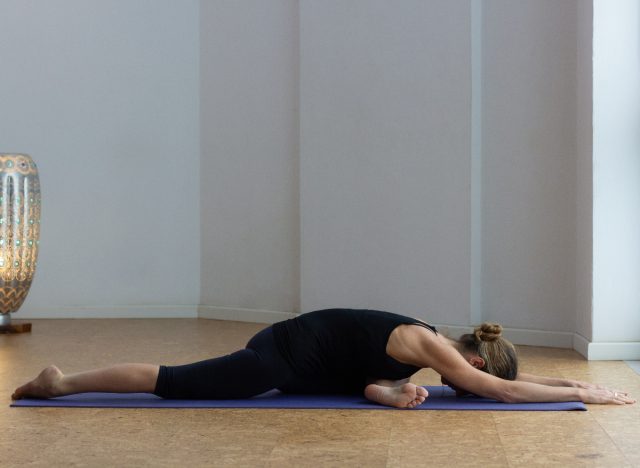What You Need To Know About Training for Your First 5K, Personal Trainers Say

Considering running your first 5K? Congrats, we’re so excited for you! The 5K, which is about 3.1 miles, is a great first race for new runners because it’s an achievable distance to work up to, says NASM-certified personal trainer Michele Levy. “Sometimes when people start out running, they set a really big goal, like a 10K, half marathon, or a full marathon. Those distances can feel physically and mentally overwhelming, making it hard to start and stick with a training program. On the other hand, you can work up to running a 5K over a few months by training for 20 to 30 minutes a few days a week. It’s not overly daunting,” Levy tells us.
Running in a 5K is also great for newbies because it’s so much fun. But the best part? Participating in a 5K usually benefits a rewarding cause, making it a feel-good event all around. “Depending on where you live, there are usually local 5Ks happening every month, and they often have engaging themes. Some, like the Turkey Trot, are holiday-themed. Others center around costumes or a certain type of food, like the NYC Pizza Run.”
Ready to put yourself to the challenge to cross the finish line? We asked Levy and three more trainers for their most helpful 5K prep and race day tips. Here are the takeaways you don’t want to ignore. Read on to learn more about training for a 5K, and next, be sure to check out The 6 Best Exercises for Strong and Toned Arms in 2022, Trainer Says.
You need at least two months of consistent training

Whether you’re new to running or just haven’t run a 5K before, practice makes perfect. That means giving yourself enough time to build your cardio stamina by consistently training, says Karen Dunn, running coach, personal trainer, and owner of Strengthen Your Stride. “I recommend giving yourself eight to twelve weeks of consistent training time before your race. Running is accumulative, so the more you do it, the more your fitness will improve, and the more enjoyable race day will be as well,” Dunn says. Staying consistent can also help ward off injury, notes Kai Ng, aka “Run Coach Kai,” a USATF and RRCA certified running coach.
What exactly qualifies as consistent? It depends on your training program, but you’ll likely need to lace up your sneakers three or four days a week. If you’re on a budget, consider downloading a “couch to 5K” training plan or app—there are loads to choose from, Run Coach Kai says. If you want to invest a bit more in your running journey, Run Coach Kai recommends hiring a coach like himself to write you a custom training program. “A good coach can build you a program from where you currently are and provide you with the proper training and racing paces. From there, all you need to do is show up, follow the plan, and do the work,” he says.
Related: Shrink Belly Fat Faster With These Walking Workouts, Trainer Says
You need to walk before you can run

Most couch to 5K-type training programs for newbies kick off with walk/jog intervals, says Dunn. So, for example, on day one, you might do 60 seconds of running, followed by 90 seconds of walking. You’d then repeat that walk/jog interval for eight or nine rounds. “At first, the time walking will likely be more than time spent running, and that’s okay! Over time, the goal is to reduce the time walking and increase the time jogging, with the goal of being able to run 3 miles without stopping,” Dunn explains.
Warm-ups and cool-downs are a big part of training

New runners are prone to tightness and soreness, but warming up and cooling down can help you feel your best and ward off injury, Dunn explains. To warm up, check out our expert-backed running warm-up routine. To cool down, walk for 5 to 10 minutes and then do some dynamic stretches like pigeon pose or downward dog with calf marches, Dunn recommends.
Related: Walk Off Belly Fat With These Secret Cardio Tricks, Trainer Says
The right shoes can make or break you

Just because something looks like a running shoe, that doesn’t mean it is a running shoe, cautions Run Coach Kai. “Proper running shoes are flexible, allowing your feet to move with a full range of motion, and light enough to not hold you down,” he says. So how can you find one that fits the bill? Levy advises heading to a specialty running store.
“Ask to speak with a specialist and have them test your running gait. The specialist will be able to tell you how your foot lands when you run and can offer you a variety of footwear options tailored for you,” Levy says. “I see so many people buy the wrong sneakers for their feet because the shoes are a cute colorway or their friend has the same pair. But you should invest in running sneakers that make you feel like you’re floating on the road! Happy feet, happy runs!”
Strength training will make running more enjoyable

Strength training can help you run faster and prevent injuries, says Vanessa Liu, a NASM-certified online fitness trainer, so consider it a non-negotiable as you ramp up for your race. “For example, if you have weak glutes, your knees might feel strained because they’re taking the brunt of the force as you run,” Liu explains.
Run Coach Kai agrees that strength training is a must for injury prevention and recommends starting off by adding planks and squats to your weekly training session to build a strong core and legs. If you want a more personalized program as you get more into the groove with running, a personal trainer can create one for you.
Have a predictable routine on race day

When it comes to running and racing, rituals are everything. “Generally, on race day, you want to avoid trying anything new because you don’t know how your body will be affected,” says Liu. That means sticking to the same shoes and clothes you generally train in and eating the same pre-workout meal or snack. “For example, if you wear a new race shoe, you might get blisters. And you might risk digestion issues if you eat a new breakfast,” Liu explains.
Focus on having fun—not the clock

“For your first race, it’s best to focus on enjoying the experience and having fun, even if you have to walk part of it,” says Levy. “The last thing you want to do is get too caught up on hitting a certain time goal. Not only could that lead to an injury if you push yourself too hard, but you may also forget to relish the experience—people cheering for you, how your body feels after each mile, and the sites you’re seeing. Once you get a 5K under your belt, you can challenge yourself by trying to beat your time or doing a longer race.”